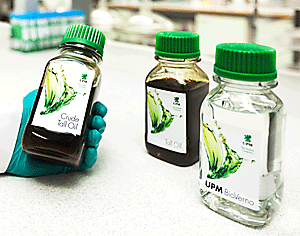 Construction of the world's first biorefinery producing wood-based renewable diesel in Lappeenranta, Finland, is progressing according to schedule, reports project developer and owner UPM, Helsinki, Finland. The foundation stone of the UPM Lappeenranta Biorefinery was encased this past Monday (November 12). Construction began last summer and the biorefinery will start producing renewable diesel made from tall oil in 2014.
Construction of the world's first biorefinery producing wood-based renewable diesel in Lappeenranta, Finland, is progressing according to schedule, reports project developer and owner UPM, Helsinki, Finland. The foundation stone of the UPM Lappeenranta Biorefinery was encased this past Monday (November 12). Construction began last summer and the biorefinery will start producing renewable diesel made from tall oil in 2014.
"The EUR 150 million investment in Lappeenranta is UPM's spearhead project and the first step on our way to becoming a significant producer of advanced second generation biofuels. The Biorefinery is also a focal part in the realization of our Biofore strategy, combining the bio and forest industries," says UPM President and CEO Jussi Pesonen.
The UPM Lappeenranta Biorefinery is the first significant investment in a new and innovative production facility in Finland during the ongoing transformation of forest industry. It will be realized without public investment grants.
The Lappeenranta Biorefinery project is important for the local economy and employment, UPM notes. Construction of the biorefinery will offer work for nearly 200 people for approximately two years. When production commences, the biorefinery will directly employ nearly 50 people and indirectly about 150 people. The biorefinery will produce 120 million liters of advanced, renewable diesel fuel annually.
"UPM is executing the company's renewal strategy persistently and expects that the operation possibilities and competitiveness of industry is maintained rather than hindered with short-sighted decisions. UPM is still the biggest and most versatile wood refiner in Finland. In the past 10 years, the company has invested nearly EUR 700 million in Eastern Finland," Pesonen says.
"One of the greatest features of the Lappeenranta project is that it combines the know-how of many UPM'ers. By utilizing our own development work, a sustainable wood-based raw material is converted into high quality transport fuel that truly decreases emissions and is suitable for modern cars. The quality of our end product and its environmental characteristics has gained significant interest among a wide range of customers. The seamless cooperation of UPM'ers is needed in the future, too, to enhance the growth of our biofuel business," Pesonen adds.
TAPPI
http://www.tappi.org/